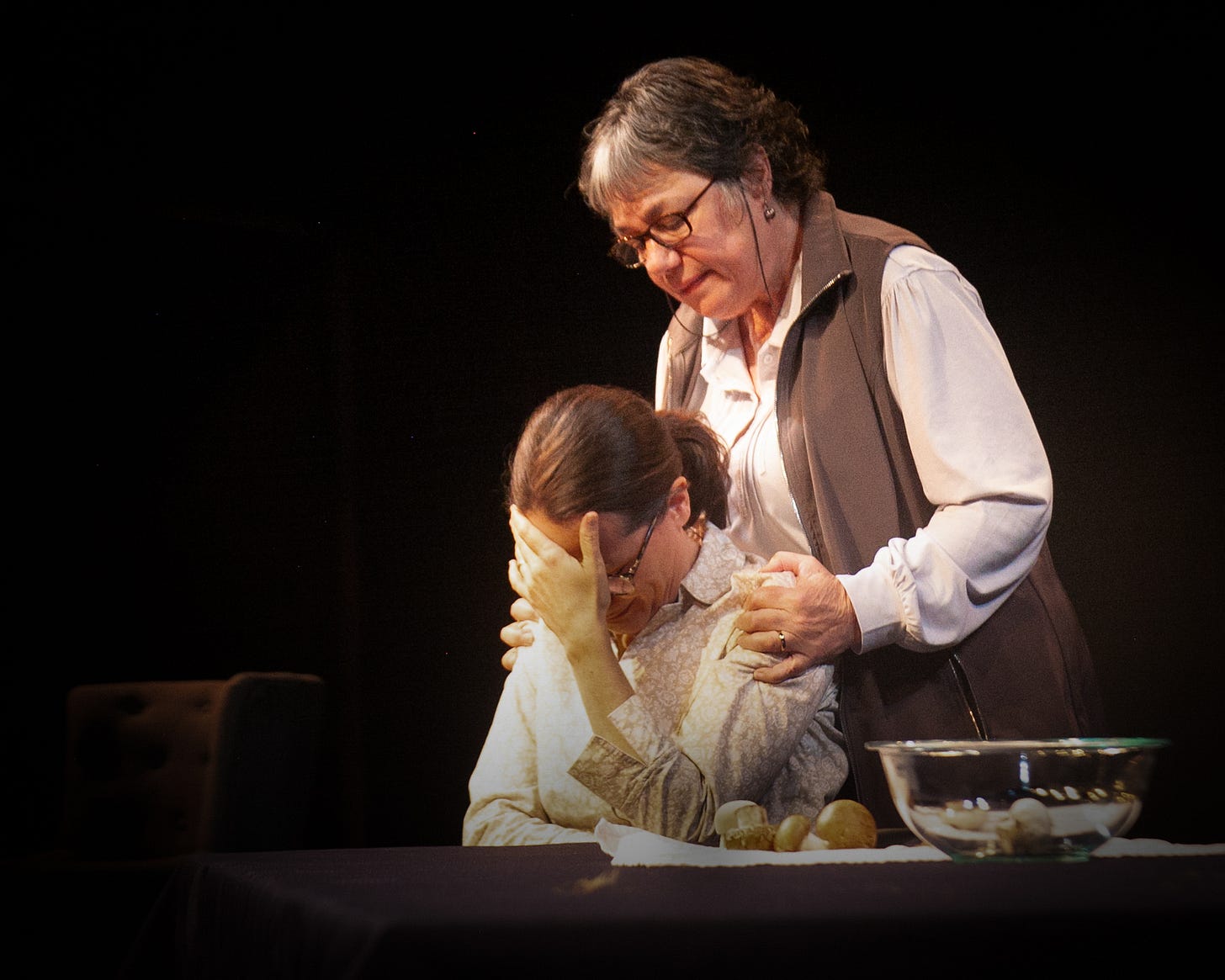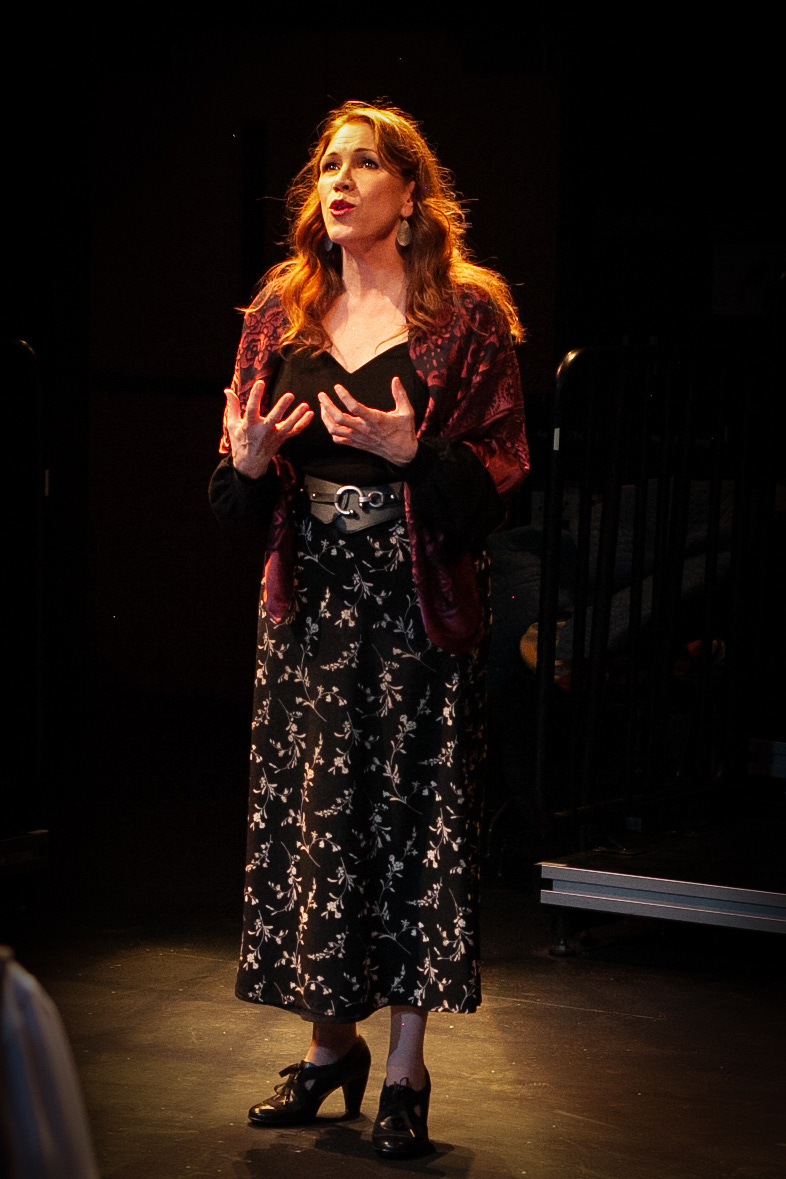The Height of the Storm is the Height of Sacramento Theatre
This 90 minute juggernaut reminds theatregoers what it is to be a theatre lover.
I see a lot of theatre and I always keep the programs (side eye to programs delivered by QR codes) because they are little keepsakes. I don’t generally read the programs before the show begins because I am that theatregoer that arrives 5 minutes to curtain despite knowing damn well how irritating it is to house managers who are just trying to get the show on the road. So I didn’t have time to read the program for The Height of the Storm at Black Point Theatre but if I had, I would have read this beautiful caveat that playwright Florian Zeller wrote about this play:
“I try to construct little labyrinths in which the audience member tries to find out where they are. You hunt down the truth, but as soon as you think you’re able to grab hold of it, it takes on another form and slips through your fingers … For me the theatre is above all the place for questions, not answers. For doubt more than certainty or conviction.”
So I want to start out with my own caveat: I saw this play because my absolute best friend in the world was in it and I want to make it clear (as you’ll soon find out that this is a *RAVE* that she did not influence me with anything other than her performance.)
Having gotten that out of the way, let’s get down to business.
As I sat in the intimate (and blessedly air conditioned) West Sac Black Box Theatre to see Black Point Theatre’s latest production, I found myself immediately starting to quantify it. As a writer and storyteller, I always want to know what kind of play it is, what is the context, what is the playwright’s intention etc. And from the first few moments, as you meet André and his daughter, Anne, you begin to believe that The Height of the Storm is a memory play.
A memory play is a form of drama in which the plot is driven by memories of the main character, typically reflecting on significant events or experiences from their past. The most famous memory play being Tennessee Williams' The Glass Menagerie, where the protagonist, Tom Wingfield, narrates and reflects on his memories of his family and their struggles. The play unfolds as a series of recollections, capturing the emotional essence of the characters' past while also commenting on the nature of memory itself.
So as I took in the melancholy André (Tom Rhatigan) and the emotionally exhausted Anne (Taylor Burris), I thought, “Well, someone must be dead.” Afterall, the synopsis provided by Black Point via their website reads: “André and Madeleine have loved each other for decades. Their marriage has been their sanctuary, their safe haven at the center of life’s storm. When their daughters come to visit for the weekend they find that the foundation is slipping away. Nothing is as it seems as the layers of their lives are slowly peeled away. Florian Zeller’s intimate play explores the intricacies of family life, love and loss.”
So imagine my surprise when a burst of energy in the form of Madeline (Producing Artistic Director of Black Point, Adriene Sher) entered the space. Madeline’s entrance changed everything I thought I was seeing and I found myself letting go of the idea that I had to “figure it out”. As I began to relax, I thought to myself, “Maybe it’s an un-memory play. Un as in unreliable narrator.”
We confront the themes of both legacy and truth very early on and the script, while lyrical and beautiful, is imperfect in the way that it goes about telling that story, much like our own memories of our lives. And the production design mirrored that imperfection that became beautifully significant in its minimalism.
The set, made up of cabinets with no doors, held only the basic items that make up a home, a life. An early monologue of Madeline’s about trying to find a vase only made sense after I realized that we as audiences members were supposed to see that vase in the cabinet the the whole time but Madeline could only see it once she opened the invisible cabinet door: highlighting the fact that we as humans can only see things, situations, people clearly when we stop deceiving ourselves.
The sound design crafted by Kathleen Poe is not so much as an underscoring but a soundscape. The home that is the center of Madeline and André’s life is a symbol of their isolation from the world, from their family, from each other and Poe’s design is affecting from the moment you enter the theater. In addition to the prerecorded soundscape, cast member Andrew Fridae (A Man) provides live sound effects that underscores a particularly tense scene between Madeline and a stranger from André’s past, The Woman played by Nina Collins-Patrick.
The performances by the cast are both evenly matched and uniformly well executed. Under the helm of director Janis Stevens, Rhatigan and Sher lead this imperfect script with specificity and clarity that makes the material shine. Sher plays the grounded but still vibrant and constantly moving matriarch with a zeal that contrasts to Rhatigan’s dreamy pensive patriarch in a symmetrical synchronicity that is delicate to behold. With a script that goes back and forth between realities, the leads are an anchor to each other and the rest of the cast that gripped me and kept me engaged and emotionally charged throughout the brisk 90 minute runtime.
The performances of Nina Collins-Patrick and Andrew Fridae cannot be praised enough as they were tasked with playing roles that had their objectives shift and roll from sentence to sentence, going from antagonist to comforter with just a flicker of their facial expressions. To watch Collins-Patrick shift from mysterious stranger to unapologetic maybe-seductress to well meaning old friend was both jarring and a masterclass in the intricacies vocal pitch. Rounding out the ensemble are the performances of Christi Van-Eyken and Taylor Burris as the daughters of André and Madeline who are in the height of the storm with the parents, their contrasting performances of optimism and realism driving home the stakes and the realities of aging parents - a generous balance brought out as only a skilled director as Stevens can achieve.
So should you see The Height of the Storm despite my warnings of an imperfect script?
To quote the playwright once more: “For me the theatre is above all the place for questions, not answers.”
However, my answer is emphatically that The Height of the Storm, directed by Janis Stevens is a masterpiece. The performances, direction, production design and subject matter come together so beautifully that this is quite simply the best theatre production in my recent memory.
See it before it’s gone.
Production Dates / Location
May 10, 11, 16, 17, 18, 23, 24, 25 at 7:00 p.m.
May 19 & 26 at 2:00 p.m.
*There will be no late seating for this production.*
Run time - 90 minutes without intermission.
Black Box Theater
1075 West Capital Ave.
West Sacramento, CA 95691
(916) 455-0163





Going on Sunday because of this review!!!